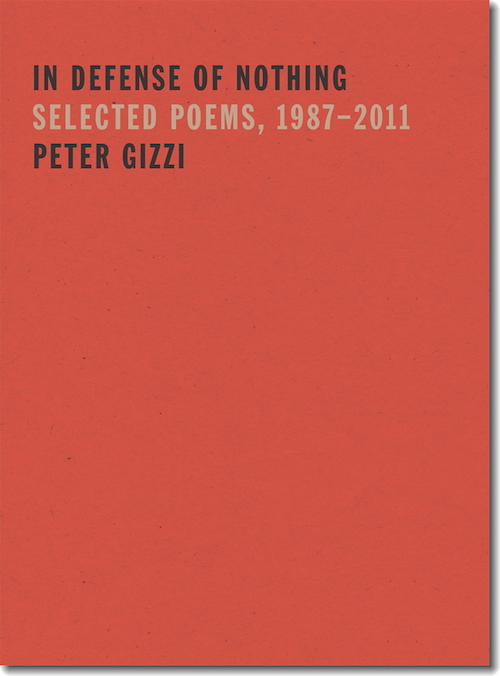Taking Stock of Peter Gizzi as Lyric Poet: Chris Hosea Reviews In Defense of Nothing: Selected Poems, 1987–2011

Today, an earlier one from this year that was promoted to the front page of Jacket2: Chris Hosea reviews Peter Gizzi's In Defense of Nothing: Selected Poems, 1987–2011 (Wesleyan). "One of the signal pleasures" of the book, writes Hosea, "is that it offers a chance to take stock of Gizzi’s remarkable growth as a lyric poet during those years." More:
The Outernationale (2007) sees Gizzi complicating the maximal longer poem which has become his trademark. Particularly fascinating examples, here, are “A Panic that Can Still Come Upon Me,” “Beacon,” “Homer’s Anger,” and the longer poem titled “The Outernationale.” Also included are short lyrics which refine and make more resonant Gizzi’s work with powerfully concentrated forms, imbuing them, for readers, with a more potent felt charge. Threshhold Songs (2011) represents an especial flowering of this kind of short lyric, one in which threads of deeply unnerving personal losses and grief are formed into affecting melodies that become more than the sum of their private sources, and indeed stand as rare examples of truly popular song in recent lyric poetry.
But it is in the longer poems, I think, that Gizzi reaches his maximal artistry. In particular, “Homer’s Anger,” from The Outernationale, builds on the kind of relentless, questing tradition of the beat howl, rumblings which may have identified themselves as the cry of freedom in extremis. The sixth part of “Homer’s Anger” concludes:
Do you know what I mean when I said anger is not emotion? When everyone is stolen I will begin in rain. Not to be wrong but uncertain, to want more than this sentence. If I say darkness is still when it falls, understand I am moving toward you.Here is a poetic that begins with a radical rebuilding of the modernist lyric and never loses its obsession with this undead tradition. Nevertheless, Gizzi’s work has moved toward a recuperation of the Romantic project, proffering a speaker as straw man and stylized avatar. This poet begins with formulae and witty critique, and develops into a master of powerful argument who makes music through play upon resonantly traditional themes. One’s sense of speaker and reader is never stable in these poems. Indeed, the poet’s troubling of these categories refreshes them in his recent poetry. If Gizzi would purport to defend “nothing,” as the title of this Selected suggests, it is perhaps the “nothing” that, in Auden’s formula, poetry makes happen.
Read it all at Jacket2.


